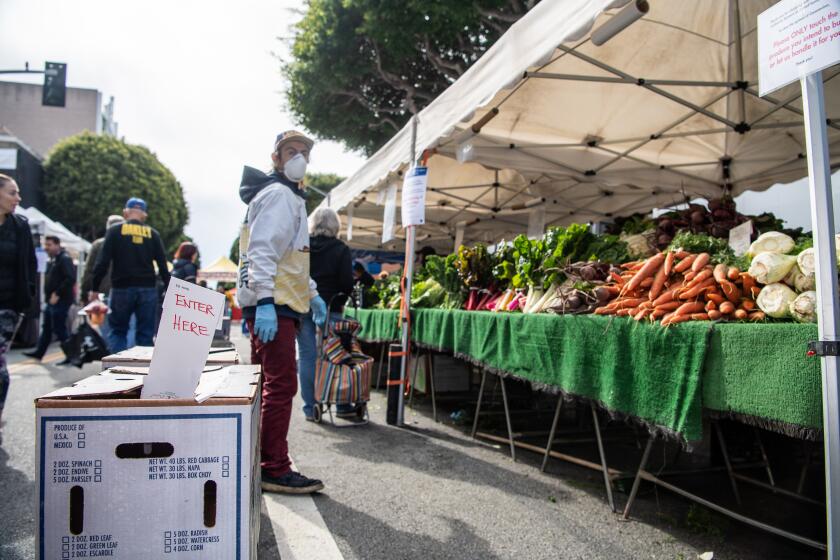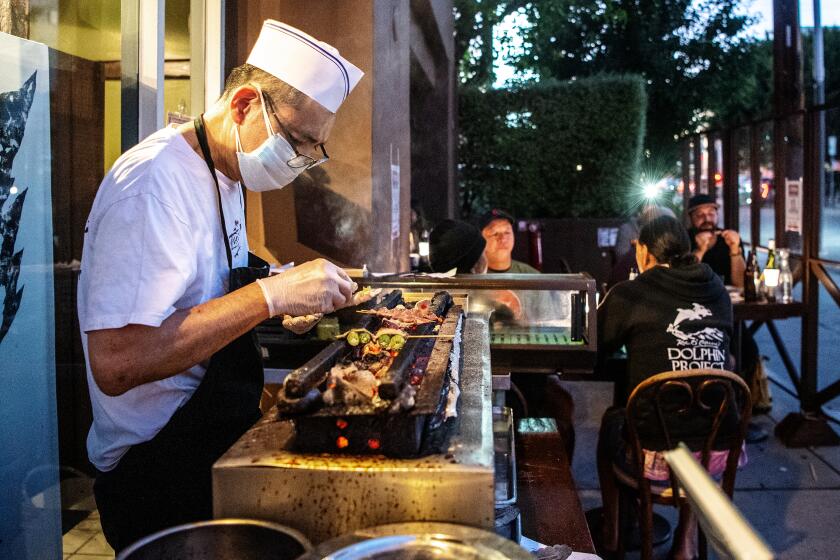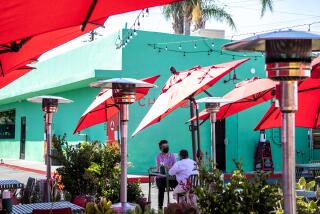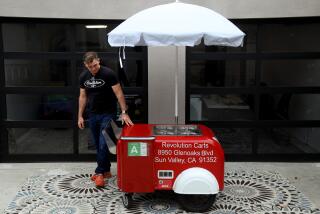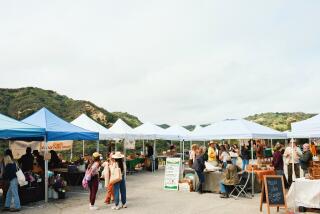Prepared-food vendors at farmers markets try to battle coronavirus ban
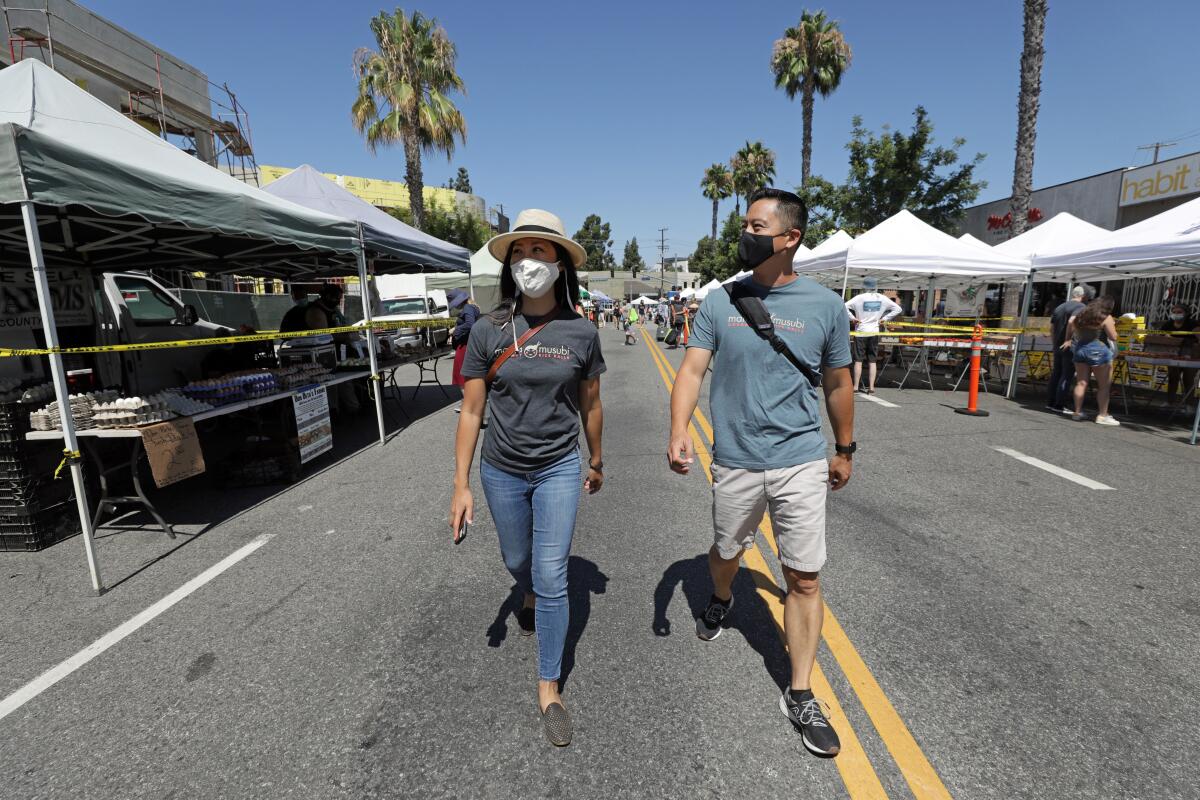
The scent of freshly prepared food wafting through the Studio City Farmers Market used to entice customers every Sunday.
But that aroma — of grilled hot dogs, stuffed pupusas, smoky barbecue and savory crepes — has disappeared since Los Angeles County health orders shut down vendors who prepare food on-site at farmers markets.
The lines for Mama Musubi’s protein-filled, nori-covered rice balls used to be “crazy,” owner Carol Kwan said. But that was before health and safety restrictions were put in place to stem the spread of the coronavirus.
Now, Kwan — who left a career in finance to start Mama Musubi with her brother, Phillip — is worried the business could perish because of the pandemic.
Kwan said she is frustrated that other venues, including restaurants that seat customers outside and permitted food trucks and street vendors, can serve food outdoors.
Since Mama Musubi has been barred from operating at the five weekly markets it had usually served, Kwan has had to lay off 13 workers.
She and her brother are hoping to more fully pivot to a delivery service based in Pasadena, which they have been using to maintain some sales, but they’re “burning through savings,” she said, and business is down 80%.
“We love being with people and serving people food. … Not being able to do that would be difficult to get over, difficult to swallow, because it’s been eight years and we’ve thrown everything we’ve got into this,” Kwan said.
Shoppers at the Santa Monica Farmers Market are now asked to abide by new social distancing measures in light of the coronavirus pandemic.
Several local farmers markets suspended operations in early March at the beginning of the coronavirus outbreak in the state. But within a week, the Los Angeles County Department of Public Health deemed certified outdoor farmers markets essential businesses, allowing them to operate under certain guidelines, including the end of samples and a ban on the sale of unpackaged food items.
In July, the health department allowed prepared-food vendors to switch permits so their businesses could sell prepackaged food at markets, but Kwan said that keeping her typically made-to-order rice balls cold would ruin them. She thinks the restrictions should be lifted.
“It’s really unfair. It’s super inconsistent,” Kwan said, pointing out that restaurants have long been allowed to serve takeout amid the pandemic and eateries are now allowed to serve diners outdoors under Gov. Gavin Newsom’s latest health order.
Esther Walker, director of the Studio City Farmers Market, agrees.
“These are very small businesses who have managed to survive and employ a lot of people over the years. And they are going to lose their homes, going to be evicted,” Walker said.
“We don’t see the difference between being able to order takeout from a restaurant versus ordering takeout from the farmers market. It’s also an outdoor event. Everyone is telling us it’s safer to be outdoors.”
Since July 1 — when Gov. Gavin Newsom once again shut down indoor dining at restaurants in L.A. County — outdoor dining has be.come a crucial lifeline for restaurants as they scramble to adjust to new rules and regulations
To adapt to COVID-19 restrictions, the market has placed tape directing mask-wearing customers to walk in only one direction and brought in security guards to ensure compliance. Vendors have moved into a parking lot and spaced out to allow for greater physical distancing. The Studio City market eliminated sampling and told the bounce house operator not to come anymore — before those restrictions were put in place by the county, Walker said.
“None of us are going to do anything we don’t feel safe doing,” she said.
Still, as the coalition of small businesses tries to rebound, it faces hurdles. Sales are down nearly 40%, Walker said.
She thinks health authorities have singled out prepared-food vendors while allowing similar businesses to reopen because the vendors lack power.
“Farmers markets don’t have a strong lobby group,” Walker said. “They aren’t supermarkets or anything like that. It’s just kind of being lost.”
Aubrey Yarbrough, the community development manager for Farmer Mark, which operates two farmers markets in L.A. County and two others in Orange County, tried to challenge the policy with a June 22 petition to the health department. Walker, representing Studio City, signed on alongside managers representing 12 Los Angeles markets and a handful of prepared-food vendors.
In her petition, Yarborough said vendors were struggling and asked that venues with space to physically distance be able to bring back food vendors. Health authorities rejected the emailed appeal within hours.
“We take the COVID threat very seriously,” Yarbrough said, noting that Farmer Mark’s Hermosa Beach market permanently closed because of the pandemic. “It just didn’t seem to make a whole lot of sense to ban this one type of vendor. They’d be working with masks and gloves behind a screen wall. … We’re already spacing out booths and limiting the number of customers.”
The L.A. County health department defended its policy in an email to The Times.
“While the sale of whole uncut produce and pre-packaged food items is permitted, prepared food sales are not because individuals tend to buy their food and then eat it while walking around the farmers market — doing so without a face covering,” the department said. “With approved food carts and mobile food trucks, the risk of community transmission is lessened due to the smaller numbers of customers being served.”
Walker said the farmers markets are “way safer than the street vendor who’s selling hot dogs on the corner, who’s permitted and been allowed to sell during this entire time.”
She has removed the tables and chairs from the Studio City market. “We can control people,” she said. “If our hot dog vendor is selling hot dogs, they’re going to be wrapped and handed to someone in a bag to take home. There’s no place to sit and eat a meal.”
Mama Musubi fans have been messaging the business’ Instagram account, asking when it will return.
Kwan said she’s having a hard time responding. She worries that if the rules aren’t changed soon, there will be no business to reopen.
“It’s just really hard to see all of this, in a situation where it’s out of our control,” she said.
More to Read
Sign up for Essential California
The most important California stories and recommendations in your inbox every morning.
You may occasionally receive promotional content from the Los Angeles Times.
